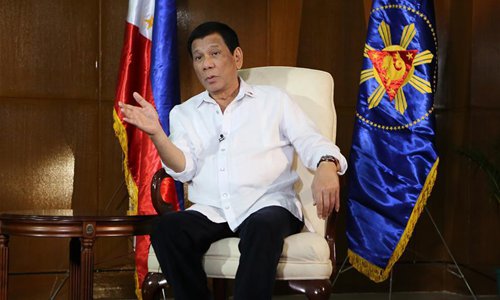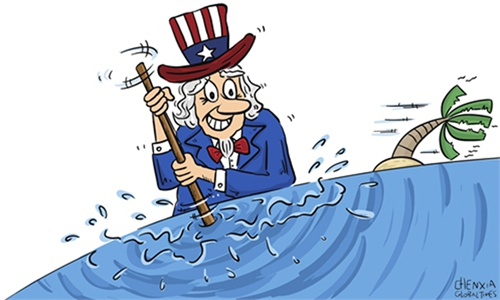
Philippine President Rodrigo Duterte speaks during an interview with Chinese media in Manila, the Philippines, Nov. 7, 2018. (Xinhua/Rouelle Umali)
A recent article published by the National Interest claimed that "American is certainly not getting its bang for its buck, and Manila has been an increasingly unreliable partner." It regarded the Philippines as the "'least valuable player' among the thirty-four nations with which the United States has a formal military alliance treaty" due to the country's "wavering commitment and underperformance," Washington's "dismal returns on security cooperation efforts," and "disproportionate risks" assumed by the US through the Mutual Defense Treaty. In particular, it pointed out that "the Philippines is falling short of US expectations" in terms of deterring "Chinese expansion in the South China Sea."This article has made it clear the true expectations of the US for the Philippines - Washington hopes Manila to be a pawn to help it contain China. The US is now disappointed with the Philippines, because the Duterte government has sidestepped the previous Aquino government's confrontational approach toward China, and instead adopted a relatively friendly China policy. The National Interest article believes Manila now is the "'least valuable" US ally. From the US' point of view, this is true.
But the US should realize that Washington itself is one of the reasons why the Duterte government has opted for a balanced diplomacy rather than a pro-US foreign policy. Washington in recent years has pointed fingers at the Philippines' domestic affairs and Southeast Asia hadn't received much attention during Trump's tenure. Besides, the development of the US-Philippine alliance has also fallen short of Manila's expectations. For instance, Washington hasn't done enough to help Manila in coping with its anti-terrorism efforts. From this sense, the US is an unreliable partner to the Philippines.
The US-Philippine alliance failed to meet the expectations of the US, because under Duterte's policy, Manila has refused to tie itself onto the chariot of the US to contain China. This has frustrated the US' attempt to take advantage of its alliance system to suppress China. When it comes to the South China Sea issue, there are three roles that Washington hopes Manila will play. First, a provocateur. The US wants the Philippines to constantly make provocative moves to stir the South China Sea issue so that it can cause diplomatic trouble for China. Second, a cooperator. When the US takes actions that would create wave in the region, such as organizing joint drills in the South China Sea, Washington hopes Manila can be part of them. Third, a vanguard. Washington hopes Manila can rush to the forefront of causing trouble for China at appropriate time just like the Aquino government that initiated the South China Sea arbitration in 2013.
However, the Duterte government has basically maintained its rationality in dealing with the South China Sea issue and its stance conforms to the national interests of the Philippines. For Manila, confronting Beijing over the South China Sea issue won't bring it any benefits. The South China Sea arbitration case has laid this point bare. The ruling now is nothing but a piece of scrap paper.
Duterte's China policy has made Manila benefit from cooperation with China in multiple dimensions. This policy is in line with the common interests of China, the Philippines and the region. However, it is not what the US expects, thus affecting the US evaluation of the Philippines as an ally. With the adjustment of US strategy, how to contain China has become the most important goal of the US in Southeast Asia, especially the South China Sea. Therefore, to what degree Manila can be used to check China has become a yardstick for Washington to evaluate the value of the Philippines. This reflects that the US regional strategy has been on a track that focuses on China-US competition and a crackdown on China. When an ally is judged by whether it cooperates with the suppression of China, this is also an indication of a distortion of the US regional policy.
In utter disregard for the interests of its allies, the US has put its own interests above those of its allies and made the greatest use of its allies to serve its own ends. This has in fact transcended partisanship. No matter which party takes office, they will exploit and make use of the US' allies to serve strategic and security goals. The only difference will be the methods. Trump bluntly threatened and coerced allies, while Biden tends to rally its allies against China by offering some verbal encouragement and emphasizing unity.
Noticeably, not all allies are willing to be kidnapped by US interests. Among allies like the Philippines, many people hold a rational view that they should maintain a balance between China and the US and avoid being embroiled into the competition of the two giants, because if they become involved, they will suffer the most. Other US allies are also more likely to make their choices based on their own interests, their national condition and assessment of the international situation as well as China-US relations.
The author is research fellow and deputy director at the Institute of International Relations of the Shanghai Academy of Social Sciences. opinion@globaltimes.com.cn

